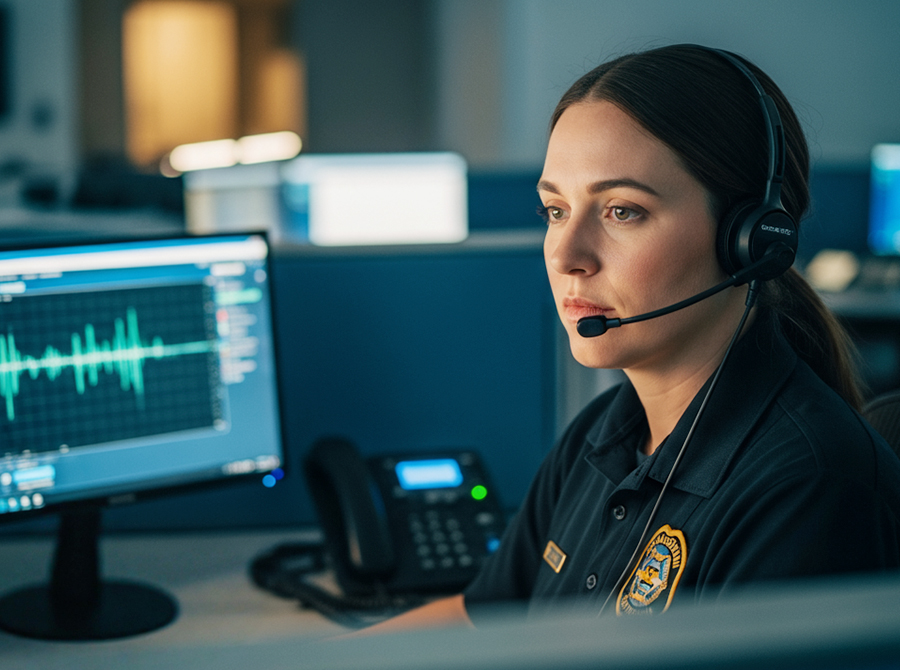Effective 9-1-1 dispatch training is more than memorizing protocols, reading policies, or checking boxes on a syllabus. When it comes to effective 911 dispatcher training, technical knowledge is essential, but the true art of online 9-1-1 dispatcher education lies in teaching the whole human being—preparing call-takers to respond with skill, empathy, and resilience under pressure. Effective 911 dispatcher training requires a holistic approach that integrates technical skills with emotional resilience.
At PLS, we understand that effective 9-1-1 dispatcher training goes beyond the handbook. That’s why every lesson is packed with layers of additional content designed to engage the mind, sharpen practical skills, and support the emotional well-being of dispatchers.
Why More Than the Handbook Matters
In the 9-1-1 center, every call brings complexity: emotions run high, details are fragmented, and decisions can carry life-or-death consequences. Dispatchers need more than a script. They need:
- Context for understanding why protocols exist
- Psychological insight to navigate stress and moral complexity
- Practical strategies to maintain focus and resilience
By integrating supplementary resources, online training becomes richer, more memorable, and more applicable to the real-world challenges dispatchers face. Effective 911 dispatcher training is fundamentally about applying knowledge under stress.
The PLS Approach: Layers of Learning
Each PLS lesson goes beyond procedural instruction, building a comprehensive learning experience that prepares dispatchers for the full spectrum of real-world challenges.
The 9-1-1 Call
Every lesson begins with a detailed review of an actual 9-1-1 call. This serves as the foundation for all other lesson components. Dispatchers hear the call as it happened and follow along with expert analysis that highlights:
- Key decision points and best practices
- Verbal and non-verbal cues from callers
- Critical timing and sequencing of responses
- Emotional, cognitive, and technical challenges
The second part of the lesson discusses protocols, dispatcher wellness, and other topics such as:
Dispatcher Wellness
This article, written by Nikole Roberts, Psy.D. features actionable guidance to help 9-1-1 dispatchers manage stress, reset between calls, and build long-term resilience. From microbreaks to breathing exercises, these strategies turn mental health awareness into practical habits. Through these practices, effective 911 dispatcher training is further enhanced.
Psychology Snapshot
Written by Stella Benami, Psy.D., a former dispatcher turned psychologist, these insights examine the cognitive and emotional aspects of lessons from a dispatcher’s perspective. They help call-takers understand how stress, decision-making, and human behavior influence performance. Insight into these facets is crucial for effective 911 dispatcher training.
Medical Objectives
These articles are written by Dr. Mitchel Schwindt who is a highly accomplished emergency medicine physician. They give dispatchers confidence and knowledge to provide accurate, life-saving pre-arrival instructions, reinforcing their technical competence.
Dispatcher News
Relevant updates, industry trends, and lessons learned from other centers keep dispatchers informed and connected to the broader public safety community.
Tech Tidbit
Dispatchers rely on technology every day. Short tech-focused insights help them understand new tools, troubleshoot issues, and optimize workflow in real-time situations.
Why Layered Learning Works
By including multiple dimensions of learning each lesson, PLS ensures that our training:
- Engages multiple senses and thought processes, increasing retention
- Builds resilience alongside skill, reducing burnout risk
- Prepares dispatchers for the real world, where calls are messy, emotional, and unpredictable
This holistic approach transforms lessons from simple policy reviews into immersive experiences that speak to both the head and the heart of dispatchers. When training connects skill, heart, and mind, dispatchers are better prepared, more confident, and more capable of thriving in the high-stakes world of emergency communications. Effective 911 dispatcher training is pivotal to ensuring dispatchers meet the challenges of their demanding roles.
Ready to strengthen your center’s 9-1-1 dispatcher training?
Give your team the training they need to perform at their best—every call, every shift, through effective 911 dispatcher training.
Visit https://policelegalsciences.com/.


